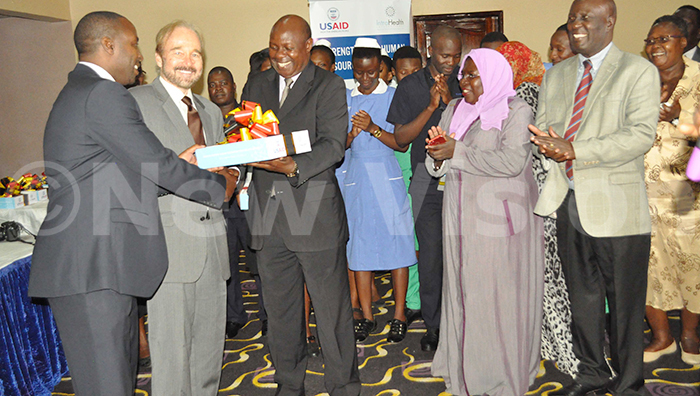New health training curricula unveiled
On Tuesday, the ministry of education unveiled a revised health training curricula for public and general health nursing, pharmacy, Anesthesia and medical theatre techniques.
PIC: The state minister for sports Charles Bakkabulindi launching the new curricula at hotel Africana on Tuesday. (Credit: Farooq Kasule)
HEALTH
KAMPALA - For a long time, many patients have complained about being mishandled by nurses and midwives.
This is greatly attributed to the mode of training they undergo before taking on the noble job. However, this is about to change.
On Tuesday, the ministry of education unveiled a revised health training curricula for public and general health nursing, pharmacy, Anesthesia and medical theatre techniques in order to promote competence based health workers in the country.
According to Gertrude Lwanga Kasujja, the principal public health nurses college, Kyambogo, the training of public health nurses dates back in 1960s with the training of assistant health visitors at Nsamizi, in Entebbe.
"In 1976, a need to train a better cadre of nurses at diploma level was conceived but with no defined curriculum until 1996 when it was developed which has been in use to date," Kasujja noted.
Kasujja explains that it has been a challenge to use the 1996 curriculum given the prevailing disease burden, emerging health conditions, neglected tropical diseases and changing world in the filed of world and technology.
Presiding over the event at hotel Africana, Charles Bakkabulindi, the state minister for sports commended Intra-health international and USAID for funding the revision and updating of the curricula which he said is responding to the skilling Uganda strategy.
"Skilling Uganda strategy empathises a paradigm shift from classroom teaching to practical skills taking up higher percentage of training.
"Therefore, I am grateful to be part of this important function when we are witnessing the launch of assorted curricula in health training," Bakkabulindi said.
Bakkabulindi noted that the new curricula will create employable skills and competence relevant in labour market instead of puting emphasis on education certificates, which would make graduates compete favorably both locally and internationally.
"I am so much impressed that after two years of struggle, now we have developed a curriculum that can address the skills needed for employment," he said.

State minister for sports, Charles Bakkabulindi handing over a copy of the New Curricula to Huzaifa Mutazidwa as Hajat Safina Musene looks on at Hotel Africana. (Credit: Farooq Kasule)
Bakkabulindi implored the nurses to first attend to patients before requesting for money.
The Commissioner Business, Technical, Vocational Education and Training (BTVET) Hajat Safina Musene explained that implementation of the curriculum will be done in a practical manner, mainly in clinical areas, school laboratories and classrooms.
"The new curricula have been structured in way that various competences that students go through to implement them has been guided and students provided with a book which will guide them as they learn," she said.
Musene disclosed that the tutors have also been given a teachers guide to ensure students gain the required skills for them to deliver service to Ugandan in the health sector.
She revealed that they consulted medical personnel including nurses before coming up with the curricula.
Dr Anthony Jackson welcomed the new curricula, saying that it will ensure quality products.
"As the ministry of health we are the consumer of products that come from ministry of education and we are happy with the development. Without quality training, you cannot expect quality products," he said.
Kasujja said the new curriculum is designed in a way that a trainee graduate is not labeled incompetent.
USAID representative, Stacy Lamon observed that updating health training curriculum is an important step towards producing a health workforce with skills and competences to meet Uganda's current and future health needs.
Lamon disclosed that they have focused their support towards strengthening the human resources information system to provide reliable data for decision making at all levels including recruiting health workers to increase their availability.
"This curriculum is a product of multi-stakeholder partnerships and in order for us to sustain these interventions, we need to work closely with the government, faith based and other non-state partners to co-create solutions and strengthen local capacities," Lamon said.
Lamon noted that although the curricula has been revised and updated but unless it is effectively implemented by training tutors and providing relevant textbooks, Uganda will not get quality graduates.
He said USAID will continue to play its role in improving the collaborative development of the health workforce in the country.
Dr Vicent Oketcho said health workforce is critical for attainment of good health outcomes that why they put it at fore front as intra-health international.
Oketcho revealed that Intra-health international has also introduced a bursary program, which has so far produced 715 health workers.